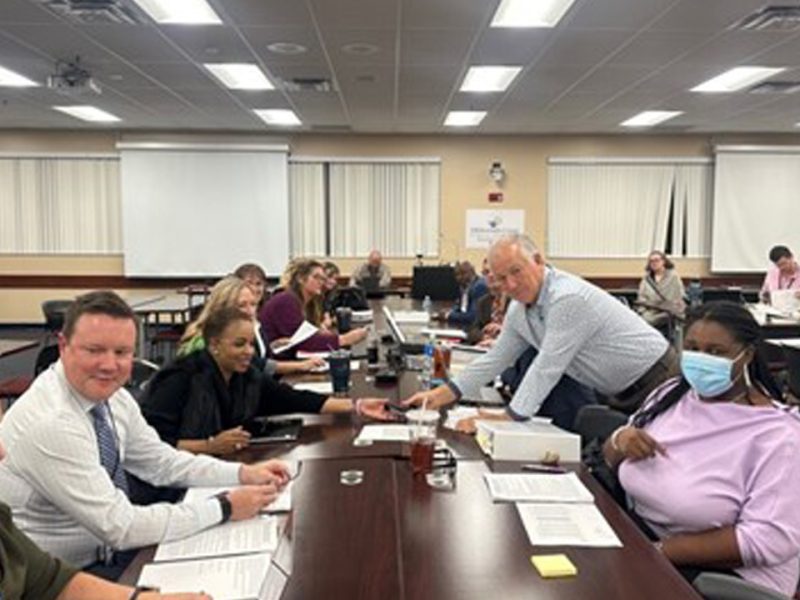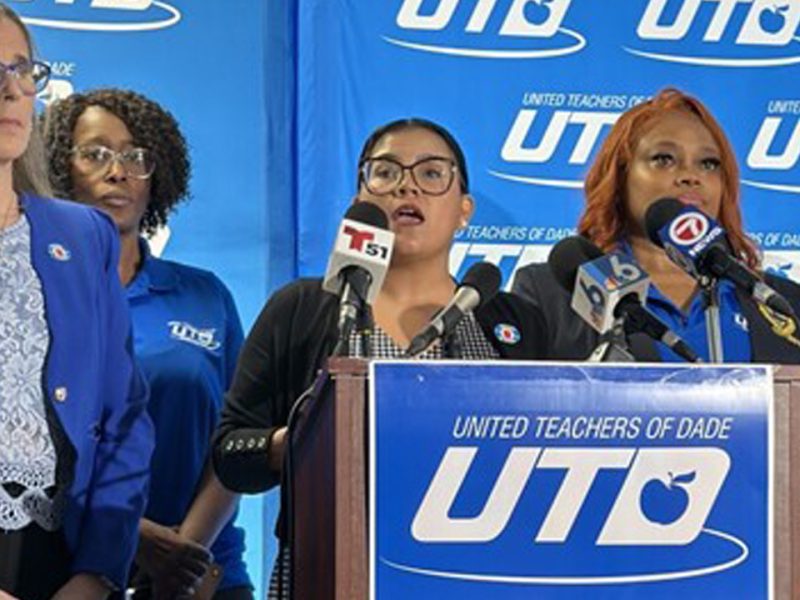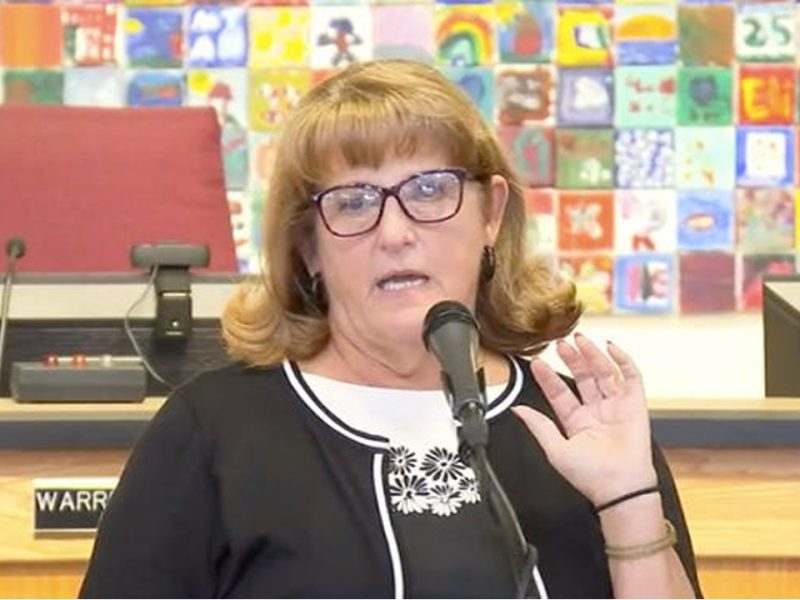
Damaging Trust with Unions, Flagler School Board Rejects a Rebate to Employees that Its Own Teams Had Agreed To
Flagler Live | May 17, 2022
The Flagler County school district’s teacher and service employee unions have suspended collective bargaining negotiations with the district following what both unions say is a breaking of a pledge by the district to award one-time health insurance premium rebates to employees. The unions consider that “bad faith,” breaking trust in the district, damaging what for many years had been cordial relations between the two sides, and raising the possibility of more formal measures.
The dispute emerged after district negotiators had agreed to award up to $900 in insurance premium rebates to employees in the coming year–$100 for every year an employee has worked for the district, up to nine years–only for the negotiating team to come back to the table and say: no deal. The district team did so last week after a closed-door meeting of the Flagler County School Board, where the proposal was voted down.
“The topic that was tentatively agreed to by the District’s negotiating team was a new idea for consideration involving health insurance,” Kristy Gavin, the school board’s attorney who sits in on closed door sessions of the board. “Unfortunately, the District’s Chief Negotiating Team TA’d the idea before it had been presented to the Board for consideration.” TA means tentative agreement. “The tentative agreement on the part of the chief negotiating team was unfortunately premature. The Board values its relationship with the unions and as we are at the beginning of negotiations with all areas of the contract up for consideration looks forward to collaboratively working with the unions to successful outcomes.”
Asked whether the insurance rebate proposal was still on the table, Gavin said “the topic could still be brought up and discussed,” though it had been voted down by the board.
Expect an outpouring of union members at Tuesday evening’s School Board member, when the members will protest the board’s decision and attempt to sway it back their wat.
“From where we sit, what they’ve done is the definition of bad faith bargaining,” Katie Hansen, president of the Flagler County Education Association, the union representing teachers, said. “We are consulting with FEA’s legal staff to determine what our recourse and next steps for what they’ve done is.” FEA is the Florida Education Association. Hansen said just as she is empowered by her membership to negotiate on its behalf, the same is true of the negotiating team on the other side.
Two days after the teachers union learned of the take-back, the district’s negotiating team told the same thing to the Flagler Educational Support Professional Association’s Brun Hudson and his team.
“They apologized profusely and they said they had to pull the offer back,” Hudson said, “which is kind of an unprecedented event because normally that does not happen during bargaining. And it sets a terrible tone, because you have that broken trust between the unions and the district. And we’ve spent a lot of time building that trust, not just during my presidency, but by previous presidents for like the better part of 30 years. We’ve been trying to build that trust with the district and we had it, and now that trust has kind of eroded away.”
Hudson, like Hansen, had to report the development to the union’s membership. “It was a shock to my team,” he said. “It was a shock to our service unit director. And it’s been a shock to all of our members now that we have to come back and tell them that oh, by the way, and you know, we said we said you’re going to get this money, but now you’re not.”
With close to 1,800 employees, the school district is the county’s largest employer. It is self-insured through Brown and Brown. Teachers, directors, and service employees all pay the same insurance rates regardless of income, depending on the plan they choose. The employee’s share of premiums across three available plans range between $67 a month to $284 a month for an employee without dependents, and from $1,305 a month to $1,864 a month for an employee and family. Vision and dental plans are separate, additional costs. (See the rate sheet here.)
The district has an insurance committee that combines members of both unions, including Hansen and Hudson, district staff and other employees. The collegial body is a collective that has nothing to do with the union negotiating teams: it’s meant as a unified advisory group. It met for the last time about two months ago, when it finalized plans for the coming year’s insurance rates. Those plans would then be submitted to the school board for ratification. At that meeting, Hansen found out from the district’s insurance broker Brown and Brown, that there was $4.2 million in the insurance reserve fund. The minimum required in that fund is $1.2 million, or the equivalent of two months’ worth of claims. (last year the district had $10.2 million in claims.) So the reserves are over-funded.
The money could not be used to increase the district’s contribution to the insurance premiums. But the reserves could be used in other ways to lowering costs. Not long ago, the district used some of those reserves to pay for repairs to the pool at Belle Terre Swim and Racquet Club, Hansen said, reasoning that employees use the pool, it improves their health, and therefore it’s a legitimate health-related expense.
“So our team was having conversation about how do we best use that the money that’s in the insurance reserve because we certainly have far more in there that needs to be in there,” Hansen said. The team came up with the rebate idea. The district and the unions were conducting what’s called “full-book” negotiations: every three years, the collective bargaining agreement is renegotiated from start to finish. The insurance rebate proposal was part of those negotiations.
The district negotiating team, which is led by Assistant Superintendents Bobby Bossardet and Paul peacock, along with Human Resources Director Jewel Johnson and Finance Director Patty Wormeck, all welcomed the idea, Hansen said, calling it creative, out-of-the-box thinking, and appeared willing to sign on at two successive negotiations meeting. A memorandum of understanding was drafted. The “loyalty” rebate was set at a maximum of nine years because the district has been self-funded for nine years. It would only go to the 1,100-some employees currently enrolled in the health plans. (See the April 22 MOU).
By the unions’ calculation, there would have been a one-time cost of over $ million only if every single employee qualified for the full $900 rebate. That’s not the case. The union estimated the actual cost to be closer to $800,000.
“The district CFO,” Hansen said, referring to Wormeck, “said at the end of this fiscal year, they are projecting that the insurance reserve funds will be $4.3 million. Take out of that $800,000 to pay the loyalty rebate. That leaves them with $3.5 million. But they’re only required to have a minimum of $1.2 million. So we’re still leaving almost three times the minimum amount that they need to keep in there. To me our proposal was very fiscally responsible and conservative.”
The plan was agreed to by the district’s negotiating team at two successive negotiating sessions, on April 13 and April 20. “Again, literally, and I quote,” Hansen said, quoting the district negotiators’ reaction, “that this is a brilliant plan. It is financially responsible. You know great jobs thinking out of the box. We’re happy to sign this and do this for employees. So we signed and tentatively agreed to it. And then we didn’t hear anything until we returned to the table two weeks later, which was May 9, only for them to tell us that the board refuses to support this tentative agreement because they quote unquote, don’t like the numbers. That’s what we were told.”
Hansen said the district negotiating team consists of the superintendent’s executive cabinet, or “the vast majority of her senior staff at the district level that sit on this bargaining team, including your chief financial officer, and they’re not batting an eye,” she said. “So I don’t understand why the board wouldn’t support it.”
It did not help matters that the district’s negotiating team “reneged” on its tentative agreement (a word hansen used in her message to her membership) the very same week of Teacher and Employee Appreciation Week, when the district asked on its Facebook page, “Let us know about a school employee who impacted your life in school.”
To Brun, the board’s reversal also goes against the principle of being self-insured. “When you’re self-insured, one of the pluses is that you control your money, you control the money that comes in and you can do things like offer your people that are in the program, rebates. And that was one of the main reasons nine years ago we switched to the self insurance plan, so we can have a little more control over how our plans are created and how our money is used. And so yeah, again, we were shocked that the district decided to do this. It came out of the blue.”





